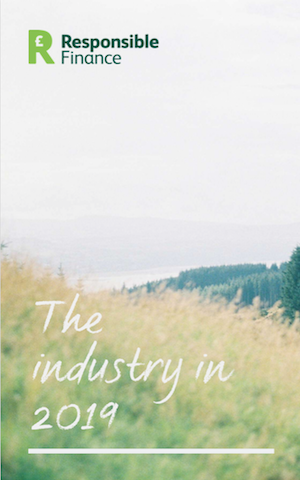New report says unless the UK’s new Government addresses four key recommendations, businesses, social enterprises and people risk lack of access to finance.
 The UK’s ethical “responsible finance” sector lent £200 million to 40,000 businesses, social enterprises and individuals in 2019, creating and protecting 13,800 jobs, according to new figures published in our Annual Industry Report today.
The UK’s ethical “responsible finance” sector lent £200 million to 40,000 businesses, social enterprises and individuals in 2019, creating and protecting 13,800 jobs, according to new figures published in our Annual Industry Report today.
Responsible finance providers (our members) supported thousands of credit-worthy businesses and social enterprises rejected by or unable to access finance from mainstream lenders.
They also helped tens of thousands of people on low incomes avoid borrowing from high-interest lenders.
The providers (also known as community development finance institutions) lend to financially excluded individuals whose only other options for credit are often exploitative and even illegal high-interest lenders and to viable but under-served businesses and social enterprises.
Transparency and affordability are key to these FCA-regulated providers, which will not lend to a customer if their loan will make the customer worse off, and do not lend to businesses or social enterprises unless it will increase the business’ chance of success.
In 2019 they saved their personal customers, who often face a “poverty premium” in higher charges for utilities and credit, £7.5 million in interest payments to high cost lenders. They created thousands of new businesses, and created and protected 13,800 good jobs in businesses and social enterprises.
Research published in Responsible Finance: The Industry in 2019 also demonstrates:
- Responsible finance providers lent a total of £200 million to 40,000 customers in 2019.
- The providers lent £78 million to over 4,200 businesses, creating 3,400 new businesses and creating or saving 8,300 jobs. The businesses they lent to reported an average £320,000 increase in turnover.
- £93 million was lent to almost 400 social enterprises – creating and saving 5,500 further jobs.
- £24 million was lent in 35,000 loans to individuals, saving low income households over £7.5 million in interest payments.
- £3.3 million was lent to over 200 homeowners, enabling people to bring their homes up to a decent standard and to stay in their own homes.
The research also demonstrates how responsible finance providers directly contribute towards reaching the UN Sustainable Development Goals – and includes four key recommendations to enable the sector to scale-up to meet un-served demand.
Theodora Hadjimichael, Chief Executive of Responsible Finance, said,
“Responsible finance providers are embedded within the communities they serve and drive local, inclusive growth. The finance and support they provide to innovative businesses, inspirational social enterprises and resilient people has had an impressive impact in 2019. It has created jobs, businesses and social enterprises. And it has alleviated the effects of poverty in low-income households through an affordable option when people with unpredictable incomes need to address unexpected calls on their finances.
“We know responsible finance providers can continue to scale-up their impact. Demand is growing but having the right environment for responsible finance providers is crucial, highlighted by the fall in total lending this year compared with previous years.
“Especially in times where political and economic uncertainty compound existing financial stress, we must continue to scale up the sector so more businesses, social enterprises and people can access affordable, appropriate and ethical options.
“Access to affordable, ethical finance means access to opportunity. Our members help under-served and financially excluded people to transform their lives. They are needed now more than ever.”
Sacha Romanovitch, Chief Executive of Fair4All Finance (established this year to support the affordable credit market), said:
“Imagine a financial system that works as well for those with unpredictable incomes and lives as it does for those with more predictable financial situations. This report from Responsible Finance shows the power of investment in this area to change lives for the better.”
Rebecca MacDonald, Investment Director of Big Society Capital (the leading social impact-led investor), said:
“At Big Society Capital, we believe that Community Development Finance Institutions (CDFIs) play a key role in increasing the supply of capital to social enterprises, underserved small businesses and individuals to help improve people’s lives across the UK.
“We’re particularly pleased to see the positive market developments in the enterprise lending CDFI space to enable them to help more underserved small businesses survive and thrive in their communities. This is especially the case in left-behind communities where small businesses are an important part of the local economy, both as employers and generators of local wealth.
“We believe there is an opportunity to significantly grow the social and economic impact of CDFIs’ enterprise lending. However, the right support and environment is needed. We’re encouraged that others are increasingly sharing this view shown through the activity of the Community Investment Steering Group.”
The full report includes comprehensive data on loan characteristics and disbursals. It calls on the UK’s new Government to continue its support of the industry by making four key commitments:
1. Ensure there is long-term and sustainable funding for business lenders, social enterprise lenders and personal lenders.
2. Update Community Investment Tax Relief to ensure it remains fit for purpose.
3. Launch a tax relief to enable personal lending responsible finance providers – which compete directly with high-cost credit providers – to attract investment in the same way enterprise lending responsible finance providers currently can.
4. Replace current EU facilities, which incentivise commercial investment into responsible finance providers, in full with the UK’s Shared Prosperity Fund.
The report is available here.
